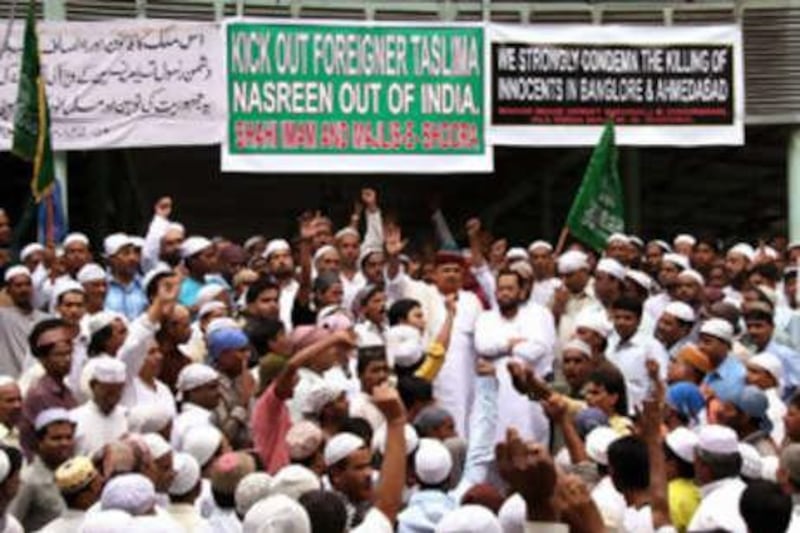KOLKATA // Taslima Nasreen, the Bangladeshi feminist author who was driven from her home country by Muslims angry with her "sacrilegious" writing, now fears she will have to leave India for the same reason. "All my dreams are gone. I am shattered," Ms Nasreen told the Hindustan Times newspaper last week. The author, who is better known by her first name, said the angry reaction from Muslims in Kolkata snowballed into a national outrage among India's Muslims which has forced her to reconsider her future plans. Last week she revealed that her current visa, which runs out in February, was renewed in August with the understanding she would be allowed to live in India for another six months to help her wind up her affairs in the country before leaving. But now she has been given her "marching orders". The author, who is currently giving lectures in Europe, now fears she may not be allowed back into the country. "Muslims [in Kolkata] were angry with my writing and so I deleted those parts from my book. But, why do they not want me to return to my Kolkata home now? Why are they still angry with me? Will they not rest until they kill me?" she said in an online interview with The National from Sweden in August. Taslima angered Bangladeshi Muslims with her novel Lajja (Shame), which described the rape of a Hindu girl by a Muslim man, and was accused of calling for changes to be made to the Quran to give women more rights. She received death threats from Muslim groups and fled Bangladesh in 1994. But after spending 11 years in Europe and the United States, she moved to India in 2005. When Taslima first arrived in Kolkata, she hoped that in Hindu-majority India she could live in peace. "Despite the wonderful hospitality [in Europe], I felt like a fish out of water there," Taslima told a Kolkata newspaper at the time. "I want to settle in Kolkata. I write in Bengali and I need to be surrounded by the Bengali language and culture." But violent incidents last year by Indian Muslims targeting the author have forced her to reconsider her future. Last August a Muslim group attacked her with chairs and stones in the southern city of Hyderabad. Members of the group later said they wanted to kill her. A week later, a top Muslim cleric in Kolkata issued a "death warrant" against her, offering a reward of 100,000 rupees (Dh7,500). In November, Muslim groups rioted on the streets of Kolkata, accusing Taslima of having ridiculed Islam in her works. The protesters turned violent and the army had to be called in. Fearing for the author's safety, authorities shifted her to the western state of Rajasthan and then to Delhi, where she was kept in a safe house. Despite her fervent appeals over the past year, the government of West Bengal - of which Kolkata is the capital - has not allowed her to return to her home in the city. Analysts confirm that growing Muslim anger is going to force her to leave the country. "Taslima cannot return to her native country. She is practically homeless. The government has decided to keep her away from the country simply with an eye on winning the Muslim vote. She is a victim of India's vote-based politics. This action of the government is unjustified," said Sujato Bhadra, an executive of Kolkata's Association for the Protection of the Democratic Rights. "Until a year ago just a few Muslim groups were against Taslima. But after the August attack, Muslims in Bengal and in other Indian States have got to know more about her Islam-bashing writings," said Abdul Rouf, a Kolkata-based columnist. "Muslims, who think they are victims of discriminations across the country, are angry with the government. To stay in power the Congress Party badly needs the support of Muslims. The national election is round the corner and so the government is showing the door to Taslima to keep the Muslims happy." Until a couple of years ago Taslima said she was not afraid of death threats and would never bow down to warnings from Muslims.
But one week after the violence last year - in an attempt to soothe Muslim anger - Taslima said she would remove three pages from her book Dwikhandito (Split in Two) that contained "insulting" remarks about Islam. However, the protests have continued. In a demonstration in September, Syed Mohammad Noorur Rahman Barkati, a senior Muslim cleric in Kolkata, said if Taslima returned to the city Muslims would protest. "She has committed an unforgivable offence and she should not be offered refuge in India. If authorities try to send the woman to Kolkata, Bengal's Muslims will react violently again," said the cleric, who led the first demonstration in Kolkata last year. While analysts said Muslims are not likely to change their stance against the author, Taslima said she hoped they would change their view about her some day and was optimistic the Indian government would become more lenient. "I have no place to go. India is my home and I would like to keep living in this country until I die," she said recently in a Kolkata newspaper. * The National





